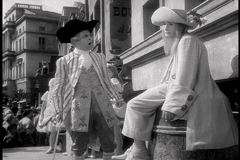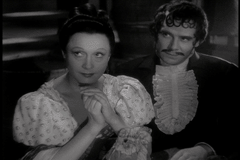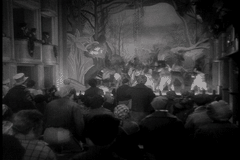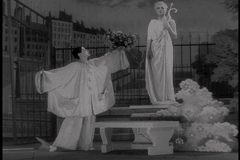Children
of Paradise (Michael Carne) 1945
 Set
amid the swirling frenzy of the French theater world, Michael Carne’s epic length
romance Children of Paradise is generally considered one of the greatest
films of all time. It’s easy to see why its mix of realism and poetic beauty
are so highly treasured. The film manages to pay its greatest tributes to the
arts simply by demonstrating how their splendor has the ability to transport the
masses into another world. Throughout the film we see several show-stopping
performances and each of them is really something special. The storyline follows
the actors that give these great performances, so during the backstage scenes,
we feel as if we’re in on some secret, since we’ve been wowed by the
artifice of the show. When originally released in the United States back in the
40’s, almost an hour of footage was missing from the film, so it’s no wonder
that the movie lacks the towering reputation here that it has attained in its
home country, where it was awarded the “Cesar of Cesars” back in the 70’s,
officially establishing it as the best French film ever.
Set
amid the swirling frenzy of the French theater world, Michael Carne’s epic length
romance Children of Paradise is generally considered one of the greatest
films of all time. It’s easy to see why its mix of realism and poetic beauty
are so highly treasured. The film manages to pay its greatest tributes to the
arts simply by demonstrating how their splendor has the ability to transport the
masses into another world. Throughout the film we see several show-stopping
performances and each of them is really something special. The storyline follows
the actors that give these great performances, so during the backstage scenes,
we feel as if we’re in on some secret, since we’ve been wowed by the
artifice of the show. When originally released in the United States back in the
40’s, almost an hour of footage was missing from the film, so it’s no wonder
that the movie lacks the towering reputation here that it has attained in its
home country, where it was awarded the “Cesar of Cesars” back in the 70’s,
officially establishing it as the best French film ever.




I
personally wouldn’t use such superlatives to describe Children of Paradise,
but it’s one of the few French (or non-French) epics to combine a populist (melo?)dramatic
span with an intimate and intellectual examination of greater themes. The movie
looks at life compared to art, and finds both lacking, yet both somehow
fulfilling. The plot is a somewhat convoluted love hexagon, all revolving around
a rather haughty and carefree woman who might have a bit too much joie de vie
for her own good. Most of the characters in this film are well drawn, and all of
them are certainly distinctive. There’s a great deal of joy in watching their
triumphs and an equal amount of heartbreak when disappointment crops up. Since
there are several protagonists vying for the hand of the heroine, the film never
feels like a simplistic cat and mouse game between right and wrong. A wide
variety of personalities emerge here, few of them clichéd. Carne’s backstage
backdrop has clearly set the standard for most theater-bound films, and its
influences can still be seen in the milieus of such modern movies as Shakespeare
in Love or Moulin Rouge.
 The
movie is an aesthetic triumph (the stunning restoration available on the
Criterion DVD of the film does it true justice) and moves at an admirable pace
for a film of such a protracted length. Divided into two halves which are set
time periods a few years apart from one another, the movie achieves a good deal
of epic scope even if it rarely leaves its wondrous yet ramshackle theater
district. The film was apparently made covertly during France’s WWII
occupation (this is one of the main reasons for its division into parts – the
Nazis would allow no film longer than 90 minutes to be filmed), and there is an
almost unspoken threat early on in the movie that the graces that keep the doors
of the theater open are tenuous at best. The struggle of art against a world
that doesn’t quite appreciate it seems to power a lot of the first half’s
dramatic thrust, and when that dissipates in the film’s remainder, things
suffer a bit. We no longer feel that we’re discovering something brilliant but
unnoticed here, and while the successes and more conventional romances that fill
the void are entertaining, they lack the attractive suffering that powered the
first half of the film. Thankfully, then, the film’s ending does not cheat on
us. In a scene that makes “The Man in White”, the title of the second
segment of the film, heartbreakingly literal we understand a profound collapse
of hope while understanding that any loss sustained will likely power greater
artistic success. The Children of Paradise which both delicately and
boldly expresses such towering concepts as love, loss, life, and art seems the
product of one who has lived through such highs and lows.
The
movie is an aesthetic triumph (the stunning restoration available on the
Criterion DVD of the film does it true justice) and moves at an admirable pace
for a film of such a protracted length. Divided into two halves which are set
time periods a few years apart from one another, the movie achieves a good deal
of epic scope even if it rarely leaves its wondrous yet ramshackle theater
district. The film was apparently made covertly during France’s WWII
occupation (this is one of the main reasons for its division into parts – the
Nazis would allow no film longer than 90 minutes to be filmed), and there is an
almost unspoken threat early on in the movie that the graces that keep the doors
of the theater open are tenuous at best. The struggle of art against a world
that doesn’t quite appreciate it seems to power a lot of the first half’s
dramatic thrust, and when that dissipates in the film’s remainder, things
suffer a bit. We no longer feel that we’re discovering something brilliant but
unnoticed here, and while the successes and more conventional romances that fill
the void are entertaining, they lack the attractive suffering that powered the
first half of the film. Thankfully, then, the film’s ending does not cheat on
us. In a scene that makes “The Man in White”, the title of the second
segment of the film, heartbreakingly literal we understand a profound collapse
of hope while understanding that any loss sustained will likely power greater
artistic success. The Children of Paradise which both delicately and
boldly expresses such towering concepts as love, loss, life, and art seems the
product of one who has lived through such highs and lows.
****
02/03/02
Jeremy
Heilman